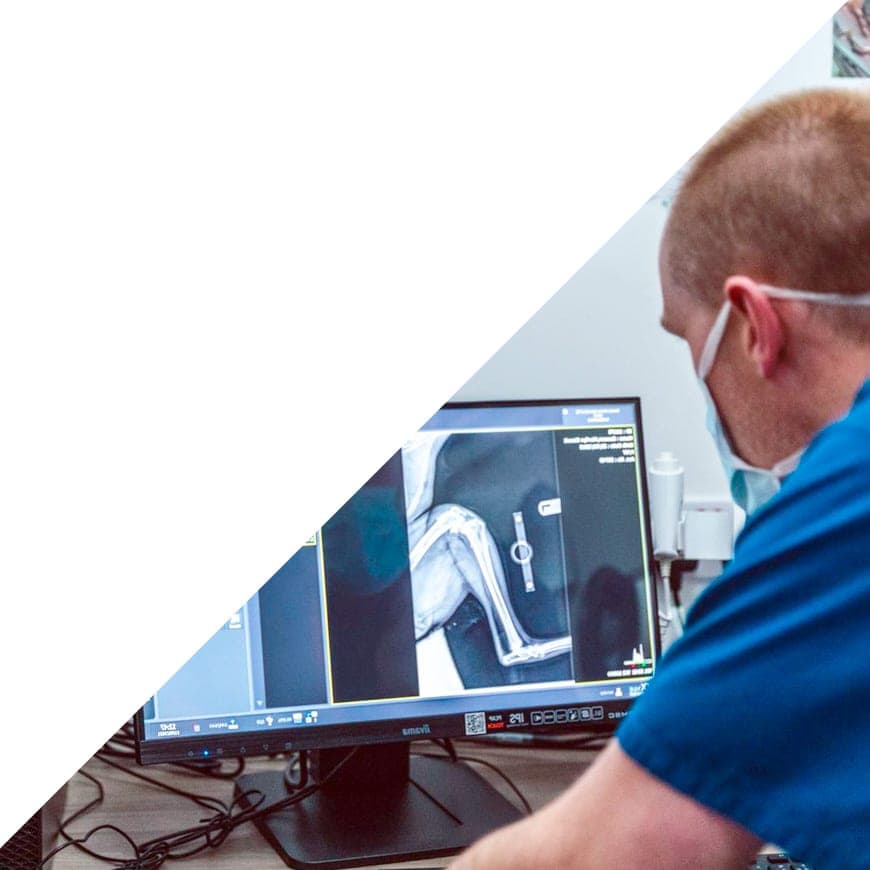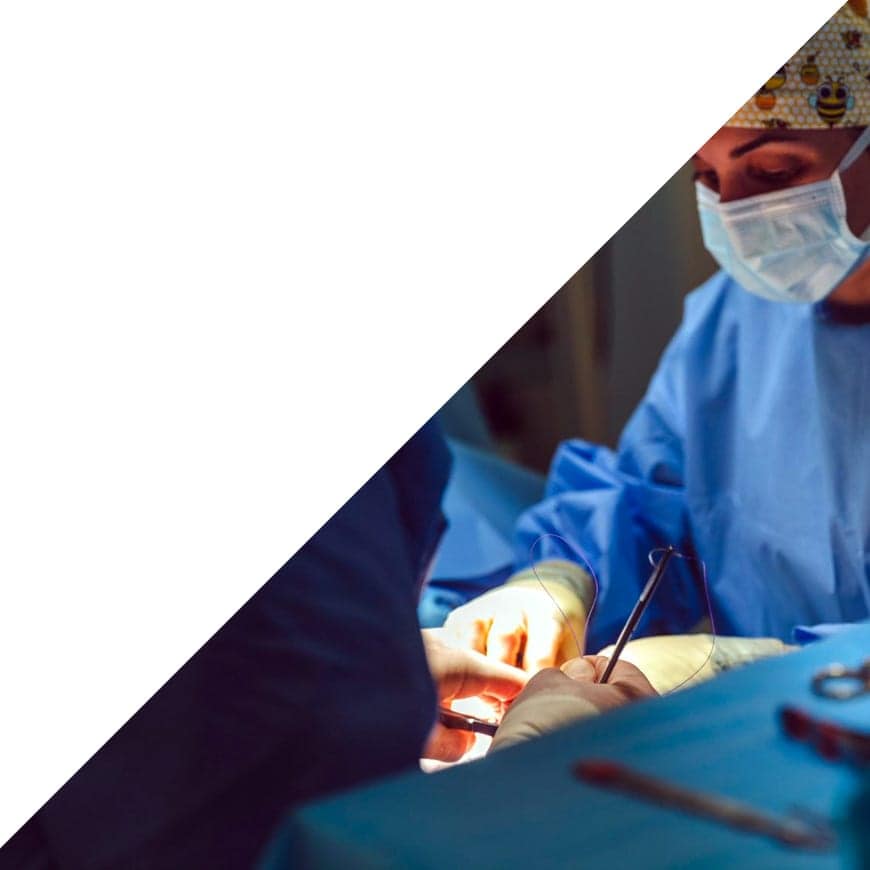Anaesthesia and analgesia
Anaesthesia has a vital role as many other specialist disciplines require anaesthesia to be able to perform diagnostic tests, treatments or surgeries. Anaesthesia is the drug-induced reversible loss of consciousness, absence of pain and immobility or relaxation of muscles.
Anaesthesia can range from a simple local anaesthetic, to numb a small part of the body to the induction of complete unconsciousness. The anaesthetist team’s priority is the safety and comfort of patients.
Cardiology
Heart problems in pets range from conditions that can be treated or managed easily to serious or life-threatening ones. The most common conditions encountered include heart murmurs, irregular heart rhythms, fainting and difficulties breathing.
Cardiology specialists will often utilise sophisticated diagnostic techniques such as advanced ultrasound of the heart (echocardiography) as well as other imaging modalities such as chest X-rays and sometimes CT or MRI to help them diagnose cardiac conditions.
Most heart conditions are treated medically, but for some heart conditions there is a surgical option, and the cardiology and soft tissue specialists offer heart surgeries for specific conditions.
We are also pleased to offer the only veterinary open heart surgery service at Dick White Referrals in the UK, of which there are only a handful in the world.
Dentistry
Our dentistry teams specialise in treating conditions of the mouth and teeth of animals. They often use additional imaging techniques such as intra-mouth x-rays and sometimes computed tomography (CT) or magnetic resonance imaging (MRI) scans to diagnose conditions and plan treatment.
They can provide treatments in the fields of:
- Periodontics (treating and saving teeth affected by gum disease)
- Orthodontics (treating and moving incorrectly positioned teeth)
- Endodontics (treating diseases of the pulp by root canal therapy e.g. fractured teeth)
- Prosthodontics (restorative dentistry and crown replacement)
- Oral surgery (with examples such as, oronasal fistula repair, cleft palate surgery, jaw fracture repair and treatment of oral cancers).
Dermatology
Dermatology specialists investigate and treat conditions of the skin, hair, ear, paw or claw.
They diagnose and manage a wide range of dermatological presentations ranging from itchy dogs, hair loss and recurrent ear infections to undiagnosed skin lesions and skin cancers.
The dermatology service benefits from close liaison with the oncology and internal medicine services to address potential underlying causes of more complex dermatology cases.
Access to specialists in soft tissue surgery allows for the surgical management of appropriate cases such as excessive skin folds and some ear diseases.

Diagnostic imaging
Diagnostic imaging is the creation of visual representations of the inside of a body. This service uses a variety of sophisticated equipment such as digital x-ray, ultrasound, MRI and CT to produce images that are interpreted by a specialist radiologist.
This essential service supports all the other specialist disciplines by providing images of various areas of the body.
Imaging specialists can also perform minimally invasive procedures under imaging guidance, such as sampling of tissues via fine needle aspirations or biopsies of diseased organs. This means that diagnoses can be reached without the need for more invasive surgery.
Diagnostic pathology
Veterinary pathologists diagnose diseases and other conditions through the laboratory analysis of samples such as blood, tissue and other bodily fluids.
They underpin many of the other specialist services by providing invaluable results and interpretation to allow diagnosis and guide ongoing treatment.
Emergency and critical care
Emergency and critical care specialists are equipped to deal with all types of small animal emergencies and usually work within an intensive care unit (ICU). Examples of cases seen include victims of road traffic accidents, sudden infections, abdominal bleeding or ingestion of toxic substances.
Their aim is to stabilise and manage critical patients to receive the treatment they require.
Internal medicine
The internal medicine specialists investigate and treat all medical conditions relating to the internal organs. This may include investigations of patients with a fever of unknown origin, coughing, difficulty breathing, nasal discharge, vomiting, diarrhoea, weight loss, liver and kidney problems, infectious diseases, blood disorders or autoimmune disorders.
The internal medicine specialists also perform several specialist procedures such as internal camera examinations (endoscopies/bronchoscopies), joint taps and bone marrow biopsies.
Due to the complex nature of many internal medicine cases, the service liaises closely with specialists in all other disciplines.
Neurology and neurosurgery
Neurology and neurosurgery specialists investigate and treat diseases of the brain, spinal cord, nerves and nerve/muscle junctions.
Advances in technology have resulted in the ability of experienced neurologists to diagnose and treat an increasing number of these neurological conditions, especially with the use of MRI and CT imaging.
Some conditions can be treated medically, but for others, surgery provides the best outcomes, and the neurology specialists will undertake spinal disc surgeries, spinal fracture repairs and tumour removals from the brain and spine where appropriate.
Nutrition
A clinical nutrition service will commonly see dogs and cats with complex and/or multiple medical disorders who may require the development of home-cooked diet formulations.
They can also advise on the best commercial diets to be fed for medical conditions. For inappetence patients, placement of a feeding tube of parenteral (intravenous) nutrition can be performed.
Oncology
The oncology specialists diagnose and treat patients with all types of cancer. Veterinary cancer treatment continues to make huge advancements, as some conditions that were not treatable a couple of decades ago can be sent into remission today.
The oncology specialists aim to provide the best quality of life for the patients under their care. Even if sometimes not curable, some cancers can be managed effectively with treatments such as chemotherapy, surgery, molecular targeted therapies, radiation therapy, immunotherapy, cryotherapy and electrotherapy.
The opportunity to really make a difference
“Over the years, specialty veterinary practice in the USA has changed significantly, where practices have become bigger and more impersonal. I enjoy being part of a new group where typically it is much closer, friendlier and more like a family. It only took one visit to Paragon to convince me that I wanted to work there.
From some of my earliest discussions with Paragon, they stressed the group’s team approach to clinical practice, which is very much aligned with my own feelings about specialty referral practice. I feel strongly that it is so important to build a team around common principles.
My job is about increasing the level of knowledge, both of owners and general practitioners, of how we treat cancer in animals.
I look forward to developing an oncology department that considers the emotional, financial, time and patient concerns of the owners, so they feel their commitment to cancer treatment for their pet is not a commitment to putting their pet or themselves through a difficult time.”
Dr Rodney Ayl, Head of Oncology, Paragon Veterinary Referrals
Ophthalmology
The ophthalmology specialists deal with all conditions of the eye, including the structures around the eye, such as the eyelids.
For certain conditions, surgical procedures are available such as for the treatment of cataracts and complicated corneal ulcers.
Orthopaedic surgery
The orthopaedics service specialises in the diagnosis and treatment of injury or disease of the musculoskeletal system which includes the bones, joints, ligaments, muscles and tendons of the body.
They see a wide range of cases, including lameness, hip dysplasia, cranial cruciate ligament disease, osteoarthritis and limb deformities.
The treatments available range from medical management and minimally invasive arthroscopic/fluoroscopic guided (keyhole) procedures to total joint replacements (e.g. hip and elbow).
Physiotherapy and rehabilitation
Physiotherapy aims to promote movement and function in pets that have encountered or are at risk of reduced mobility.
This often follows injury or illness, but it may relate to other factors such as age or obesity.
For rehabilitation, hydrotherapy, myotherapy and additional treatments such as laser therapy and acupuncture may be used to reduce pain and inflammation and improve movement and function.
They work very closely with our surgery, neurology and critical care teams to ensure optimum patient comfort and aid recovery.

Soft tissue surgery
The soft tissue service treats all surgical conditions that aren’t related to bones, joints or the nervous system.
The soft tissue specialists often see cases referred for surgery of the airways, chest, liver (e.g. congenital liver shunts and liver lobe resection), urinary system (e.g. prostatic surgery, incontinence surgery, kidney removal and ectopic ureter surgery), stomach/intestines, skin reconstruction and cancer.
As well as directly seeing in cases, the soft tissue team plays a pivotal role in managing many cases referred to the medicine and oncology services.